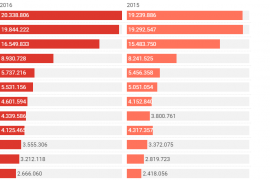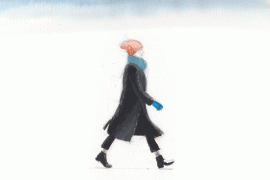It is a good day in Barcelona because, in spite of the crisis and the bad reading indexes, new bookstores keep on opening. One of the last to inaugurate is the Obaga, on 179, Girona Street, next to the cinemas, born to provide ‘written drugs’ to readers on the right side of the Eixample. I come close to the next day of the celebrated inauguration, with hundreds of people invading the bike lane, because I want them to explain me the steps to follow when opening a bookstore. How many months in advance have they prepared it? Should one own a master’s degree to be a bookseller? As for the bureaucracy, has it been too tough?
Dioni Porta and Carol Porta, the ‘suicide’ couple behind this bookstore explain all this to me. They took the decision in December, after years wondering. Because they do not come from the sector, they are merely book freaks, that wanted to go beyond reading them. The leap of faith would not have been possible without the help of other colleagues, such as Jordi (Taïfa bookstore) and Albert de (Atzavara bookstore), who explained the business to them and they assured that it is possible to live (modestly) of that. At the Obaga they are surprised by this trade union solidarity, and while we are doing this interview the companions of the Llibreria Sendak Bookstore show up, to congratulate them: their advice has also been fundamental. They looked for a place near their house, in the area of Baix Guinardó, but they opted for the intersection of Girona and Corsica streets because they did not want to settle near any other bookstore and damage the business. It has been a success many people enter the shop to congratulate them because “a bookshop was needed in the neighbourhood”. The numbers and the business plan are Dioni’s task, who is accountant: he confesses that they have had to extend the mortgage of the house where they live to face the investment. According to Carol, bureaucracy has not been too complicated. She is the one in charge of the day to day tasks and believes to be able to take advantage of the dead hours to sit in an armchair and enjoy good reading. What else do you want, I think for myself: all booksellers think they will have time to read!
They looked for a place near their house, in the area of Baix Guinardó, but they opted for the intersection of Girona and Corsica streets because they did not want to settle near any other bookstore and damage the business. It has been a success many people enter the shop to congratulate them because “a bookshop was needed in the neighbourhood”. The numbers and the business plan are Dioni’s task, who is accountant: he confesses that they have had to extend the mortgage of the house where they live to face the investment. According to Carol, bureaucracy has not been too complicated. She is the one in charge of the day to day tasks and believes to be able to take advantage of the dead hours to sit in an armchair and enjoy good reading. What else do you want, I think for myself: all booksellers think they will have time to read!
It took them three months to prepare the space. They have done it for themselves: you must imagine Dioni (who suffers from vertigo) on a ladder to demolish all the false ceiling. Because they had to do new electrical installation (one of those eventualities) they had to recruit their friends and relatives to paint, and they also pulled friends to organize alphabetically the shelves: you take A, you B, you C. “What would we do without our friends!” laughs Carol.

In order to spend most of the investment in the stock of books, the furniture also had to be low cost: all shelves are recycled, bought at the Encants market or found on the street, but do not worry, they cleaned them well and the result is amazing. Of course, until the books were on the shelves, people came in thinking they were selling old furniture.
Finally, it was necessary to choose the merchandise, a “very wild” process and in the afternoon: in a few hours they had to review the 20,000 titles offered by a distributor such as Les Punxes and decide the books they wanted. “We opted for the authors we already knew, either we read them or because we knew the quality”. And the choice has been a success: Catalan and Spanish titles are mixed, and they especially take care of the small local publishers, according to thematic tables. A week before opening, boxes full of books began to arrive, and as they unpacked them, social networks were filled with messages of encouragement and congratulations. On September 1st they took a break to get some air, and the day after the first buyers started to show up.



















